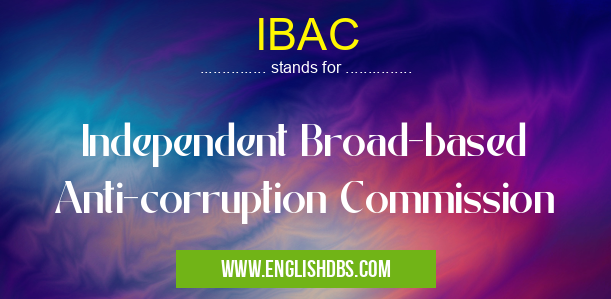What does IBAC mean in LEGISLATION
Introduction:

IBAC meaning in Legislation in Governmental
IBAC mostly used in an acronym Legislation in Category Governmental that means Independent Broad-based Anti-corruption Commission
Shorthand: IBAC,
Full Form: Independent Broad-based Anti-corruption Commission
For more information of "Independent Broad-based Anti-corruption Commission", see the section below.
Independent Broad-based Anti-corruption Commission (IBAC)
IBAC stands for Independent Broad-based Anti-corruption Commission, an independent body established to prevent, investigate, and expose corruption in the public sector of Victoria, Australia. It has the authority to investigate allegations of corrupt conduct involving public officers, public bodies, and public servants.
Key Responsibilities of IBAC
- Investigating allegations of corruption, including bribery, fraud, and misconduct.
- Conducting public hearings to expose corruption and hold accountable those responsible.
- Conducting education and awareness programs to prevent corruption.
- Providing advice and guidance to public sector agencies on anti-corruption measures.
Structure and Powers of IBAC
- IBAC is headed by a Commissioner who is appointed by the Governor of Victoria.
- It has a staff of investigators, lawyers, and other professionals.
- IBAC has broad powers of investigation, including the ability to:
- Compel witnesses to testify and produce documents.
- Intercept communications.
- Conduct searches and seizures.
Importance of IBAC
- Protects public trust: IBAC helps maintain public confidence in the integrity of the public sector.
- Prevents corruption: IBAC investigates and exposes corruption, thereby deterring individuals from engaging in corrupt practices.
- Promotes transparency: IBAC's public hearings and reports shed light on corruption, increasing transparency and accountability.
- Improves public sector performance: By addressing corruption, IBAC helps improve the efficiency and effectiveness of the public sector.
Essential Questions and Answers on Independent Broad-based Anti-corruption Commission in "GOVERNMENTAL»LEGISLATION"
What is the IBAC?
The Independent Broad-based Anti-corruption Commission (IBAC) is an independent law enforcement agency responsible for investigating and preventing corruption in the Australian public sector.
What does the IBAC investigate?
IBAC investigates allegations of serious and systemic corruption in public bodies, including government agencies, local councils, and public corporations. This may include bribery, fraud, extortion, and abuse of power.
Who can report corruption to the IBAC?
Anyone can report suspected corruption to the IBAC, including members of the public, public officials, and journalists. Reports can be made anonymously or confidentially.
How does the IBAC investigate corruption?
IBAC conducts investigations using a range of methods, including:
- Interviews with witnesses and suspects
- Examination of documents and records
- Surveillance operations
- Searches and seizures
What happens if the IBAC finds evidence of corruption?
If IBAC finds evidence of corruption, it can take a range of actions, including:
- Referring the matter to the Director of Public Prosecutions for criminal prosecution
- Issuing a report on its findings
- Making recommendations for changes to laws or procedures
- Educating the public about corruption
Is the IBAC independent?
Yes, the IBAC is an independent agency that is not subject to political or ministerial interference. It is governed by a board of independent commissioners who are appointed by the Governor-General of Australia.
Final Words: The IBAC plays a crucial role in preventing and combatting corruption in Victoria. Its investigations, public hearings, and education programs contribute to maintaining public trust, promoting transparency, and improving the integrity of the public sector.
